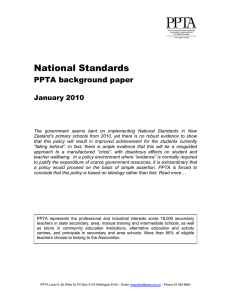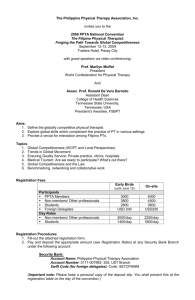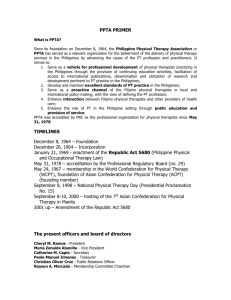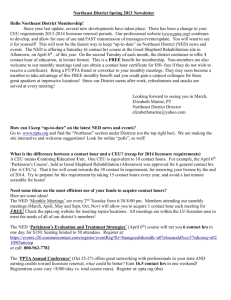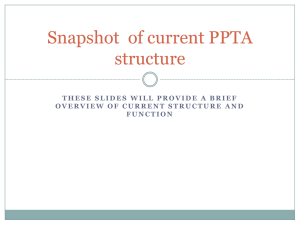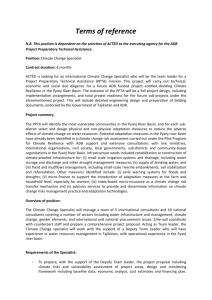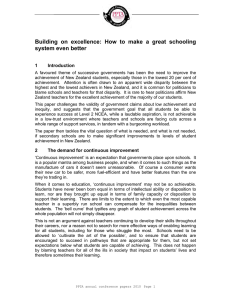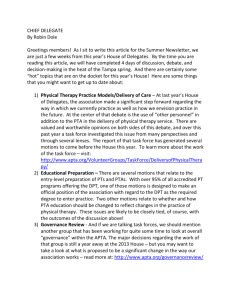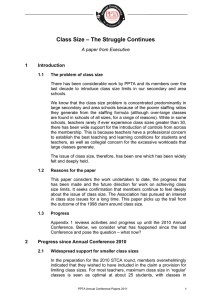PPTA News vol 37 no 1 February March 2016
advertisement
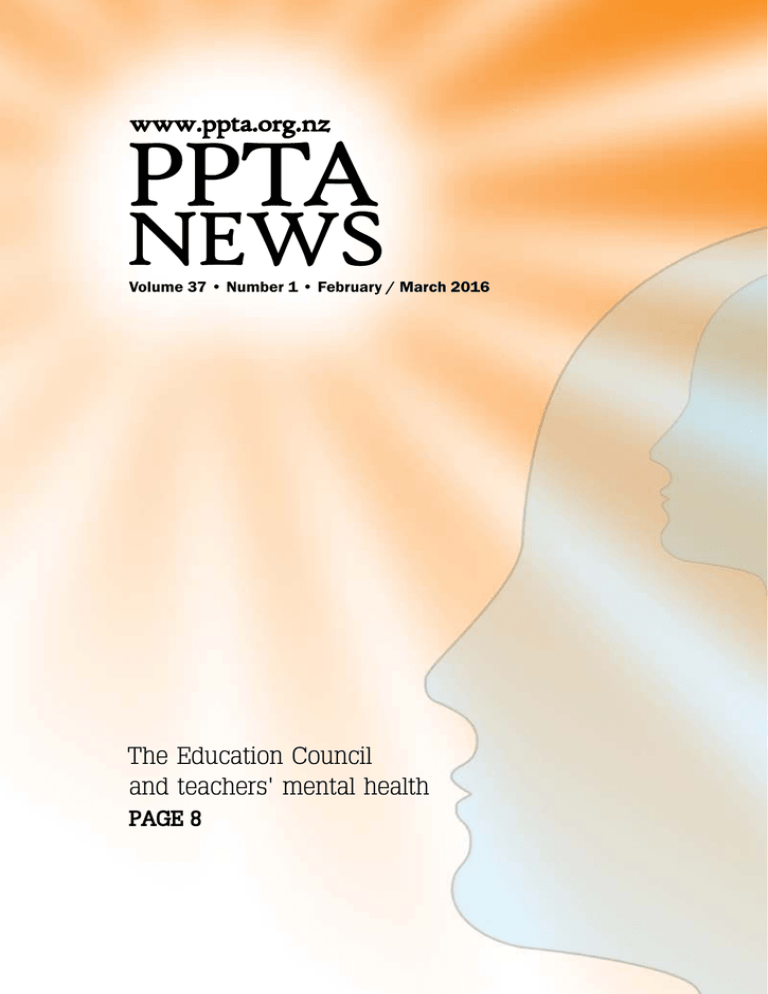
Volume 37 • Number 1 • February / March 2016 The Education Council and teachers' mental health PAGE 8 About PPTA PPTA member benefits ISSN 0111-6630 (Print) ISSN 1178-752X (Online) PPTA News is the magazine of the New Zealand Post Primary Teachers’ Association. Approximately 18,000 copies are distributed free to secondary and area schools and other institutions. Not all the opinions expressed within PPTA News reflect those of the PPTA. Editorial and advertising Enquiries should be addressed to: The editor, PPTA News, PO Box 2119, Wellington, New Zealand. Fax: 382 8763 Ph: 04 384 9964 Online: www.ppta.org.nz Email: akirtlan@ppta.org.nz Editor: Anna Kirtlan Layout and design: Ben Weston Printed by Toolbox Imaging Deadlines April edition: 5pm, 8 March for articles and ads. May edition: 5pm, 12 April for articles and ads. PPTA field officer contacts Contact your local field office for all queries about your collective agreement entitlements or for assistance with employment relationship problems. Auckland 4 Western Springs Road, Morningside P O Box 52 006, Auckland 1352 ph (09) 815 8610 fax (09) 815 8612 email: auckland@ppta.org.nz Hamilton Level 1, 650 Te Rapa Rd, Te Rapa P O Box 20 294, Hamilton 3241 ph (07) 849 0168 fax (07) 849 1794 email: hamilton@ppta.org.nz Palmerston North Guardian Trust House, cnr The Square and Main Street P O Box 168, Palmerston North 4440 ph (06) 358 4036 fax (06) 358 4055 email: palmerston@ppta.org.nz Christchurch Level 1, 501 Papanui Road, Papanui, Christchurch 8053 DX Box WX33613 ph (03) 366 6524 fax (03) 379 4011 email: christchurch@ppta.org.nz HealthCarePlus offers PPTA members health, life and disability insurance. When disruption to your health happens it’s a good idea to have affordable protection in place. The sooner you join HealthCarePlus, the sooner we can help you pay for your day-to-day health costs. ph 0800 268 3763, or email contact@healthcareplus.org.nz www.healthcareplus.org.nz PPTA members are eligible for a special banking package with Kiwibank. Kiwibank is 100% New Zealand owned and operated. It’s been thinking up ways to give Kiwis better value banking since 2002. The banking package currently includes 0.25% off Kiwibank’s advertised fixed home loan rates (excludes special offers or one-offs), 0.50% off Kiwibank’s advertised variable home loan rate (excludes revolving home loans and offset mortgage), free EFTPOS on your everyday accounts and great discounts on credit cards and insurance. Visit www.ppta.org.nz/membership/benefits to view the complete package, and the terms and conditions that apply. If you’d like to join Kiwibank, call 0800 629 008. Kiwibank Limited’s Disclosure Statement is available from your local Kiwibank or at www. kiwibank.co.nz. Hertz rental car PPTA members can receive special member rates - quote CDP no 1674602 when booking. Ph 0800 654 321 www.hertz.co.nz Dunedin Queens Garden Court, 3 Crawford Street P O Box 1561, Dunedin 9054 ph (03) 477 1311 fax (03) 477 1804 email: dunedin@ppta.org.nz Inside this issue... TRCC celebrates 70th anniversary Obituary: Ida Gaskin Charter school authorisation board should be sacked 4 5 6 2 Education Council dubious about mental health issues 8 11 PPTA collective agreement negotiation timeline Book review: Sexual Cultures in Aotearoa NZ12 PPTA NEWS Hui-tanguru• February 2016 President’s viewpoint We need you, activists O ver the summer I attended the funeral of Ida Gaskin who served as PPTA president in 1977 (obituary p5). Hearing the tributes to her from former students, PPTA colleagues and political allies got me thinking, as it should. What goes on in our classrooms is deeply political. This is because what we do, what we achieve, or fail to achieve, is so important — not just because of the impact it has on the lives of the individual students that we are charged with teaching, but for our nation and all of our futures. This is an inconvenient fact for most of us in the teaching profession. Most of us simply want to be given the professional autonomy and the professional support to get on with doing our best. Our goal is to be able to respond appropriately to each of the needs of each of our students so they can enjoy learning and success. Unfortunately it too often feels that the politics gets in the way of reaching that goal. The way that politics interferes with our professional lives can be quite unhelpful at times. The "85% NCEA Level 2" mantra is something that the minister of education says is simply part of a national conversation about reaching the Better Public Service targets. However, whether intended or not, this target infiltrates the departmental and course planning, student choices, whānau conversations, and teacher appraisals, and not always for the good of the student. It can lead to short term decisions that are about improving "passes" to reach the target that the government has clearly shown is their focus and priority rather than giving students the space to develop strong pathways that lead to achievement, lifelong learning, and successful citizens. Luckily, for the majority of us who are not remotely interested in the politics connected with our profession, we have people who are. People who are not only interested but proactively engage in, and, dare I say it, even enjoy confronting and challenging the politics that are constantly swirling around our state school classrooms. There are those who, year after year, hold branch officer positions and help make our collective agreements real. Others who ask their colleagues to join the PPTA or encourage our new teachers to attend a PPTA provisionally registered teachers course or a Network of Establishing Teachers (NET) gathering. And those who, somehow, find the time to get along to a Mahi Tika course, write a letter to the editor or make a submission to a select committee. So, as we farewell a memorable union leader, a fearless political activist and brilliant teacher, I am reminded how thankful I am that the activism is still strong in our union and in New Zealand society. While we may not be able or keen to march down the street with a banner ourselves, we are grateful and supportive of those who are. We need you, activists. We need you to keep bearing witness to the impact that policy and legislation has on teaching and learning. We need you to continue to challenge the really bad ideas and get by Angela Roberts behind the good ones (The good ones are easy to spot … not only are they rare beasts but they are also underpinned by sound evidence and are appropriately resourced!). We need you to do this so that the rest of us are not only able to focus on our students in our classrooms but have got the best possible chance of doing it well. Kia kaha, comrades! TRCC PPTA members in Auckland rally against a poor collective agreement pay offer. 3 PPTA NEWS Hui-tanguru• February 2016 Professional development Celebrating 70 years of shared teaching expertise T he Teachers’ Refresher Course Committee (TRCC) is celebrating 70 years of professional development for teachers by teachers. Seventy years ago director general of education Dr Clarence Beeby established the TRCC to give teachers a sense of responsibility for their own professional development. Its mandate was to provide a blend of theory and practice, with a strong emphasis on teachers sharing with teachers about how to make things work in their classrooms and schools. PPTA advisory officer Judie Alison said TRCC occupied a really special place in the professional learning landscape. “It offers teacher-led learning that is embedded in the in the realities of schools and classrooms. Teachers love the intensive nature of the TRCC courses, the opportunity to get to grips with something over two or three days along with colleagues from across the country,” she said. Funded by the Ministry of Education, and led by an unpaid committee of teachers and leaders nominated by the education unions, TRCC seeks out the voices of teachers and the education sector about the professional learning and development (PLD) that is currently needed. It works to make sure the smaller subject areas (such as music, dance and technology) get necessary PLD and that specific areas of need in a given sector are met. It also offers courses on "hot topics" relevant to all teachers across the sectors, for example, Carrying the Tapa – For Non-Pasifika Teaching Pasifika Students, which is on offer again this year. TRCC also seeks to support and generate networks of teachers who can 4 Teachers love the intensive nature of the TRCC courses, the opportunity to get to grips with something over two or three days along with colleagues from across the country.” remain connected and share expertise. This could be as simple as an ongoing email exchange with another course participant or could be participation in a formal association. TRCC is celebrating 70 years of delivering Dr Beeby’s vision — working with teachers to refresh, inform and inspire their practice. PPTA NEWS Hui-tanguru• February 2016 News Obituary: Ida Gaskin 1921 - 2016 By Helen Pearce (Watson) ntil the 1980s PPTA was a very male dominated organisation. In its first 30 years, there were only four women presidents. The third in 1977 was Ida Gaskin from Taranaki, her decision to stand the result of her expressed opinion that women were equally capable to men and needed to put themselves forward. Ida was unusual in that she had not served on the PPTA executive before being elected as junior vice president in 1976. In 1979, she was the executive member for Taranaki, during my first time as an Auckland executive member and spokesperson for equality. I was putting forward issues from the newly established Sex Equality Advisory Committee, quickly learning that I could always count on Ida for support. Ida Gaskin was ferociously intelligent and articulate, devoted to the value of high quality education for all children, especially those from poor economic circumstances. She loved English U language and literature, especially Shakespeare, on whom she became New Zealand Mastermind in 1983. She came to New Zealand in 1948, teaching at New Plymouth Girls’ High School from 1961 to 1980. The 1970s, when Ida was active at a national level in PPTA, saw a host of problems in secondary schools, many of which are still extant. Her presidential address to the 1977 annual conference was forceful and inspiring. Her concluding words are just as important today. “It is our job as teachers to make sure that no child is cheated of his (sic) inheritance … that the vicious circle of failure, deprivations, insecurity is broken. As an association of teachers, we must speak for the children in our care, and we must speak clearly. We fight not only for the present, but for the future: not only for the children at present in the schools but for their children and their children’s children.” Ida Gaskin was a uniquely impressive Ida Gaskin woman, dedicated to secondar y education, understanding the best way to advance that dedication was through involvement in the teachers’ professional organisation. She gave of herself unstintingly and was a very significant person in PPTA’s history. We want your side of the story It's all about PPTA News will be putting together articles about real teachers talking about what teaching today is really about — because, as we know, there are scores of influential community leaders, politicians, policy makers and armchair experts out there who like to guess. So give us a few snippets about why you teach It could be about students providing a pleasant surprise. YOU Or about going that extra mile beyond your job description. Or about the hours you put in outside nine to five, Monday to Friday. Or about an interesting initiative you and your colleagues or students are involved in. Or simply what you enjoy most about your job. The most important thing is that it’s all about YOU. Get in touch Email, or send queries, to Ben Weston, PPTA communications advisor at bweston@ppta.org.nz. Tweet @PPTANews 5 PPTA NEWS Hui-tanguru• February 2016 Charter schools Charter school board should be sacked A c o h o r t o f s t u d e n t s i s n ow collateral damage due to the incompetence of the char ter school authorisation board, says PPTA president Angela Roberts. The te r m i n a t i o n o f W h a n g a r u r u ’ s Te Pumanawa o te Wairua charter school agreement was predicted two years ago, Roberts said. As well as the range of concerns pointed out by PPTA, the Ministry of Education had warned the authorisation board — chaired by former ACT president Catherine Isaac — of the potential fragility of the school, she said. Documents made public in 2013 make this very clear with the ministry advising against opening the Whangaruru school, while the authorisation board was in favour. “The MoE is of the view that this applicant requires more time than is available to implement their proposal successfully,” the documents said. M i n i s t r y a d v i c e s t a te d ; “ T h e application suffered from a weak mission statement that, although aspiring, did not adequately communicate the need for this school in the local area.” “ T h e s p o n s o r ’ s a p p ro a c h t o behaviour for learning and creating a safe environment for their students was not well articulated.” “The application … did not demonstrate the capacity and capability of the sponsor.” E e r i l y s i m i l a r c o n c e r n s we r e rebranded as "challenges" in Education Minister Hekia Parata’s media release announcing the termination of the agreement. They included; • heavy reliance on third parties to take it forward • lack of internal capability • the difficulty of attracting suitably qualified teaching staf f to Whangaruru; and • concerns over whether a viable student base exists for the kura . “These are not ‘challenges’. They were pointed out a long time ago,” Roberts said. “The authorisation board went blithely on with the support of both the education Partnership Schools Authorisation Board chair Catherine Isaac minister and ACT leader David Seymour. It was negligent use of power. “Either they are incompetent or they are prepared to be reckless with these students’ futures,” she said. Given the inevitable outcome Roberts believed the authorisation board should be sacked. Fears over tertiary charter schools T here are so few credible applicants to become charter schools the government is resorting to fishing among tertiary institutions. Proposed changes to the Education Legislation Bill include allowing tertiary education institutions to be sponsors of charter schools. This raises serious concerns in terms of finances, capability and transparency, PPTA president Angela Roberts said. “Part of the rationale for charter schools was transferring risk of failure from the crown to private providers. If public institutions, such as a university or wananga, were to sponsor a charter school then it’s the public who are bearing the risk again,” she said. Roberts believed running charter schools would dilute the focus of tertiary institutions on their core business. She also feared they would not have the expertise and capacity to run schools for students of younger ages than they were used to teaching. “We wouldn’t want secondary schools running university courses,” she said. PPTA campaign highlights a dangerous waste of resources This change would also move aspects of public institutions’ funding out of the scope of the Official Information Act and the State Sector Act. “The notion of having publically owned and funded organisations delivering ser vices in the public 6 interest and then exempting them from these crucial pieces of legislation is a dangerous one,” she said. “The char ter school legislation is already murky enough, it will only become murkier if they keep tinkering with it.” PPTA NEWS Hui-tanguru• February 2016 Vacancies Advisory Officer We’re looking for someone to join the policy and advocacy team in our national office in Wellington. We want someone who is interested in working with secondary teachers to develop policies and practice on a range of professional issues, including curriculum and assessment, professional learning and development, educational leadership, digital literacy and student welfare. The appointee will be a member of a supportive team that is responsible for policy development in areas relevant to secondary teaching and advocacy of the collective agreements. We want someone who writes well and can work flexibly, co-operatively and collectively. Recent experience in New Zealand schools would be an advantage. Occasional travel is required. The Association is committed to partnership in accordance with Te Tiriti o Waitangi. A commitment to union goals and a high quality public secondary education service is essential. An application form and job description may be obtained from Julie Elliott, email jelliott@ppta.org.nz, phone 04 913 4228. Any queries about this position should also be addressed to Julie Elliott in the first instance. Applicants must be legally entitled to work in New Zealand. If you are not a New Zealand citizen, you must have the right of permanent residence or a work permit. Applications must be received by 5:00pm on Friday 26 February 2016 and should be marked Confidential and addressed to: Julie Elliott (Advisory Officer Position), New Zealand Post Primary Teachers’ Association PO Box 2119, WELLINGTON 6140 Deputy General Secretary The New Zealand Post Primary Teachers’ Association (NZPPTA) is seeking a new Deputy General Secretary (Policy). The position is based in the Association’s national office in Wellington and is to provide co-ordination of, and leadership in, the development and advocacy of policy in the professional and industrial areas of the Association’s affairs. This includes oversight of collective agreement negotiations and management of a team of Advisory Officers, two Communications Advisors, Te Apiha Māori and a Women’s Officer. This is a high level position and the appointee, along with leadership and union experience, will also have skills in: mentoring, dispute resolution, advocacy, education policy and collective agreement negotiations. New Zealand secondary teaching or extensive union experience plus knowledge of, or a post-graduate level qualification in, education or policy will be an advantage. A commitment to union goals and to a high quality public secondary education service is essential. The Association is committed to partnership in terms of Te Tiriti o Waitangi and is an equal opportunities employer. Applications must be received by 5.00 p.m. on Wednesday 23 March 2016 and should be marked Confidential and addressed to: General Secretary (DGS Policy Vacancy), New Zealand Post Primary Teachers’ Association P O Box 2119, WELLINGTON 6140 A job description and an application form may be obtained from Christine McNicol by phoning (04) 913 4235 or emailing cmcnicol@ppta.org.nz. Queries about this position should be addressed to the General Secretary, Ph. (04) 913 4237, Email mstevenson@ppta.org.nz. 7 PPTA NEWS Hui-tanguru• February 2016 Mental health Education Council's "lack of action" disappoints "Mentally ill teachers investigated by watchdog’" was the misleading newspaper headline that shocked teachers late last year. A s someone who had lived sensation and stigma. with depression for many “In my 11 years as chief years, PPTA Auckland executive of the Mental Health Eastern Ward executive member Foundation of New Zealand, L aw r e n c e M i k ke l s e n wa s I have seen many positive appalled. changes in the way New He decided to approach the Zealanders talk about mental newly formed Education Council health and mental illness, — an organisation charged and some improvements in with “raising the status of the media. But stories that lack profession” for a response and balance or depth can do much was deeply disappointed. to undermine the progress we " N i n e t y - n i n e te a c h e r s have made,” she said. investigated over psychological “These stories can state in six years’" was the reinforce and perpetuate sub-heading of the Dominion the myth, often created in Post article. Hollywood, that people with “A quick skim of the first experience of mental illness paragraph of the article suggests are dangerous and violent that, quite frankly, we’re leaving and should be locked away to our precious children in the protect public safety. This is hands of loonies,” Lawrence not only inaccurate … but has said in a guest post on PPTA’s a trickle-down effect, seeping Pigeonhole blog. into all aspects of individuals’ Lawrence Mikkelsen – "Does the Education Council really “It’s not until the fourth lives and affecting the way have the best interests of teachers at heart?" paragraph I discover that, people with mental illnesses actually, only four teachers a r e r e g a rd e d by o t h e r s , “I don’t consider my illness to have in this period had their registration including colleagues. ever impacted on my teaching. It certainly suspended which, given a workforce “I am by no means advocating hasn’t led to ‘aggressive, violent or of some 100,000 teachers, seems censorship, but rather a commitment to threatening behaviour toward children’ or incredibly small,” he said. maintaining balance, telling both sides ‘theft, bullying, harassment and falsifying Auckland University professor of of the story and seeking facts instead of grades,’” he said. biostatistics Thomas Lumley examined sensation,” she said. He got in touch with the Education these figures further, surprised that it In this spirit Lawrence was surprised Council via its Facebook page to see if was front page news that about 0.1% at the Education Council’s response. anything could be done about it, only to of registered teachers had been investi“How is the professional organisation be told that it thought the article was fair. gated for "possible misconduct or incomthat aims to ‘champion good teaching “We agree stigmatising people petence in which their psychological state practice and help raise the status and with mental health issues is not in the may have been a factor" over a six year image of teaching’ not really angry about interests of a caring and compassionate period — and that “5% of them (that is, the assumptions that the article makes … society. We live in an open democracy 0.005% of all teachers) were struck off that teachers who live with mental illness where journalists are entitled to ask and suspended as a result”. are a threat to the well-being of students questions about such issues. We feel the In a piece for statschat.org.nz Lumley and colleagues? story was balanced in that the journalist described the story as “a clear message “Does the Education Council really referenced the research undertaken by to anyone with depression or anxiety. have the best interests of teachers at the Mental Health Foundation and other Anyone who wants to think about the heart? sources,” the response said. children might think about what this “A few months back, in reply to This however was not the view of the message does for rather more than 0.1% another Facebook post, the Education Mental Health Foundation itself, with of them,” he said. Council stated ‘wait and see. We don’t chief executive Judi Clements penning Comparing these figures to the expect to convince teachers with our a response published in the Dominion “teacher bashing” headline had words but with our actions.’ This lack of Post calling for facts and balance over Lawrence’s blood boiling. action spoke volumes,” he said. 8 PPTA NEWS Hui-tanguru• February 2016 Mental health Young minds hold the key The Mental Health Foundation has a plan to help creative youth tackle discrimination. A ccording to the foundation there is a growing body of evidence showing young people who experience mental illness are more likely to be discriminated against than older people. To address this it has set up a new project to help young people develop creative projects to end mental illness discrimination in New Zealand. The foundation is calling for young, talented New Zealanders to apply to take part in POD (Point of Difference) ― an incubator that will give young creatives the industry contacts, mentoring and tools for making social change they need to bring their vision to life. “We’re looking for young people who are passionate about making a difference for people like them, creating a New Zealand where everyone is accepted and included,” Mental Health Foundation strategy, advocacy and research director Hugh Norriss said. Young people who experience moderate and severe mental illness often experience isolation and rejection from their peers and at home. Recent research has found that many young people have experienced name-calling, belittling attitudes and had felt excluded from their family and friends because they had experienced mental illness, Hugh said. “When young people who have experienced mental illness are excluded, everyone misses out. Friends, family members, loved ones and older adults miss out on the unique perspective that a young person who has experienced hardship can bring, and young people who are experiencing distress may not want to seek help due to fears of being ridiculed or shamed”, he said. Hugh hoped that the POD project would make mental discrimination a thing of the past. “Young people are best placed to tackle social exclusion from their peers and others. Young people listen to their peers, and they have the creativity to know what will make people sit up and take notice,” he said. Applications for the first POD close on 4 March, with further intakes in June 2016 and February 2017. To find out more and to apply, visit www.pod.org.nz POD is supported by Like Minds, Like Mine, a nationwide programme to end mental illness discrimination in New Zealand. t r e l a ip h s r e b m e m A T P P Have your circumstances changed? New Job? New address? If so, and your payslip is not showing a PPTA subscription deduction, you'll need to email us at membership@ppta.org.nz immediately and we'll fix the problem. 9 PPTA NEWS Hui-tanguru• February 2016 Education Council Teacher certification put beyond reach Thanks to new requirements by the Education Council (formerly the Teachers Council) some teachers who have been unable to get a full-time job are being asked to pay $4000 in fees for refresher courses without student loan funding. T eachers who are still provisionally certificated after six years’ teaching are being required by the council to do a Teacher Education Refresh programme before they can have their provisional practising certificate renewed. PPTA professional issues advisory committee convenor Joe Hunter said beginning teachers who, over a period of six years, can’t get a position of at least 0.5 FTTE (full-time teaching equivalent) and who have to make do with small part-time positions or day relieving, can find themselves faced with either doing the course or giving up on teaching. New teachers who leave the country before achieving full certification and then return some years later and want to start, or re-start, teaching can also find themselves unable to teach until they do the course, she said. The policy was announced as part of the review of registration in 2012, but did not take effect until the beginning of 2015. However, numbers of PPTA members affected are increasing, Hunter said. “The worst thing about this situation is that the courses cost about $4,000 and no student loan funding is available. They can be done while a teacher is working (as long as their certification hasn’t run out by that time) and involve online and face to face elements. But for a new teacher the course can be unaffordable,” she said. In 2009, when the New Zealand Teachers Council was consulting on the proposal, PPTA’s submission supported the idea that teachers should not be able to remain teaching indefinitely if they haven’t been able to achieve a full practising certificate despite having an adequate programme of induction and mentoring. It said this was not in the interests of their students or their colleagues who have to pick up the pieces. However, the submission also said the “clock must not start ticking” on the six years until the beginning teacher was 10 in a position that could lead to full certification, not from the time they first applied for provisional certification. “This proviso was ignored by the council with some very unfair consequences,” Hunter said. The submission also said failure of a school to provide proper induction and mentoring to a beginning teacher should be automatic justification for an extension of provisional certification. This has also been ignored. “While there is provision for teachers affected to request a review, the requirements to be successful are stringent,’ Hunter said. A teacher will need to have a recommendation from a professional leader, and be able to show that they are well on the way towards achieving full certification, before they will be exempted from doing a TER course. PPTA members affected by these requirements should contact their field officer for help. PPTA NEWS Hui-tanguru• February 2016 Collective Agreements Continuing negotiations A lthough the Secondary Teachers' Collective Agreement (STCA) is settled, PPTA continues to negotiate the other collective agreements its members are employed under. The Area School Teachers' Collective Agreement (ASTCA),the Secondary Principals' Collective Agreement (SPCA) and the Adult Community Education Collective Agreement (ACECA) are all about to be negotiated in the next two months, followed by Area School Principals' Collective Agreement (ASPCA) from June. A brief status report for each of these collective agreements follows. The STCA The STCA was settled in September and ratified in late October. The settlement included a three-year term and 2% wage increases from 2 September 2015 and 2 September 2016 with an average increase of 2.5% from 2 September 2017. Once again the union beat off any clawbacks to the agreement and a range of condition improvements were also agreed — including payment of Education Council practising certificate fees, more sabbaticals and some increased allowances. There were a number of issues regarding back-pay and Education Council practising certificate fees but these have been resolved. The ASTCA The ASTCA expired on 3 November. Area school PPTA members have endorsed their claim, the negotiating team is ready and has suggested a range of dates in February and March for negotiations. The team is currently awaiting responses from NZEI, The School Trustees Association and the Ministry of Education as to which dates they will agree to. The SPCA The SPCA will expire on 31 March. Secondary principals have endorsed their claims and bargaining commences on 15 February and 10 March. The negotiating team is waiting for feedback regarding further dates in March for bargaining. The ACECA There was a joint working party with the Ministry of Education and the School Trustees Association in November and December last year to bring the agreement up to date as funding and technical arrangements have changed considerably in the last few years. The parties have agreed to the union’s suggested amendment and these will be put into the agreement in this round. The collective agreement itself expires in late March. PPTA is currently seeking claims from members and is hoping to commence bargaining in March. Register now Everyone planning to attend the I & O seminar and/or the Delegate Leadership Development Workshop can download and complete a registration form by logging in to www. ppta.org.nz and visiting the “Events” section. Issues & Organising Seminar and Delegate Leadership Development Workshop 4 - 6 March 2016 | Holiday Inn | Auckland Airport | 2 Ascot Rd, Mangere 11 PPTA NEWS Hui-tanguru• February 2016 Book review Schools' inclusivity lags Sexual Cultures in Aotearoa New Zealand Critical essays edited by Alexandra C. Gunn and Lee A. Smith UNIVERSITY OF OTAGO PRESS, 2015 Review by Jerome Cargill T he introduction outlines the progressive steps New Zealand has made to becoming a more inclusive society, from the Human Rights Act of 1993 and making discrimination on the basis of gender and sexuality illegal to the legalisation of same sex marriage in 2013. However, statistics show that many “trans and queer students, or those assumed to be queer, are subjected to bullying ... highlighting how student peer groups can sometimes make schooling intolerable for queer youth”. The authors make a compelling case that “New Zealand’s relatively inclusive society is not always reflected in our educational settings” and the book is intended to raise awareness and act as a call to action. The book is divided into 14 chapters addressing various topics and issues concerning diversity and inclusivity. Lee Smith’s chapter on the school formal emphasises how it continues to be a “relentlessly heterosexual social sphere”. She investigates school policies and student attitudes and recommends ways to affirm sexual diversity through a school’s approach to the formal. In another chapter, the commonly heard phrase “that’s so gay” is addressed by Steven Sexton. The phrase is shown to “privilege heterosexuality” but also Sexton acknowledges how terms “once seen as derogatory and demeaning may no longer be considered exclusively as such”. However, the complex fabric of high school social groups and expectations means that accepting this language must be approached with caution. Some commonly used language in school playgrounds can be used with homophobic intent or to tease friends and thus teachers need to be aware of this and challenge students to think about the words they are using. Kathleen Quinlivan’s contribution The authors make a compelling case that 'New Zealand’s relatively inclusive society is not always reflected in our educational settings' and the book is intended to raise awareness and act as a call to action." looks at queer-straight alliances and the double bind that they face in operating within schools. While they provide a space for queer concerns to be raised, it is a separate space that is distinct from the rest of the school. Within this chapter, the growth and development of school-based diversity groups and local community groups is outlined. The imlocal.co.nz website, run by RainbowYOUTH, contains a register of these groups across New Zealand and ways of contacting them. A key theme across the book is the idea of heteronormativity. This is a term that draws attention to the privileging of heterosexuality as normal and natural, 12 thus having the effect of isolating others that may not conform to this identity. Throughout the book, New Zealand schools are shown to be heteronormative spaces. Heteronormativity can not only impact young people who are sexually and gender diverse, it can also narrow the understanding and empathy of all young people in terms of how they can safely and supportively function as a citizen in the modern world. Gunn and Smith have assembled a compelling collection of essays, challenging teachers to ensure our progressive societal attitudes are also evident in our education spaces. PPTA NEWS Hui-tanguru• February 2016 Teaching practice Reform and reaffirming diversity PPTA Rainbow Taskforce member Jerome Cargill discusses ways of addressing diversity in Social Sciences on the 30th anniversary of homosexual law reform in New Zealand. Photo by David Hindley I n Social Sciences in 2016, many classrooms will be using the 30th anniversary of homosexual law reform in New Zealand as a context to investigate civil rights. The isn’t the only learning area where this topic could arise, and the recent publication Sexual Cultures in Aotearoa New Zealand Education (reviewed opposite) contains many suggestions as to how this might occur. The contributors to this publication point out that the New Zealand Curriculum contains the principles of “diversity” and “inclusion”. Being aware of diverse sexualities, sex and genders and being inclusive is essential to meeting this part of the curriculum. A chapter on transgender diversity containing a set of recommendations is a helpful starting point for ensuring your practice is sexuality, sex and gender inclusive. The following are some useful points adapted from these recommendations. 1. Assume there is at least one queer or sexuality-diverse person and one trans or gender-diverse person in every class you teach. 2. Don’t assume you’ll know who that person is. 3. React to homophobic, or transphobic language to ensure a positive environment. Language sometimes heard in the classroom involves using “gay” as a pejorative, or “tranny” as an insult. 4. Use gender neutral language. For example avoid addressing groups of people as “you girls” or “you boys” when there are people in that group whose gender identities have not been disclosed to you. 5. Engage with resources that already exist and the recommendations that they make. The updated Sexuality Education Guidelines and the Inside Out video resources, both published last year and highlighted in previous issues of PPTA News, are up to date resources that can support professional development in this area. 6. It’s okay to make mistakes. Please keep trying. Homosexual law reform march, Wellington 1986. I n a n o t h e r c h a p t e r, S u s a n Sandretto writes about the way we address popular cultural texts in the classroom. These might be formal texts chosen for critical study in subjects like English or Media Studies, or they might be texts that are discussed in any classroom as part of a general conversation or relationship building with students. Sandretto shows how teachers can help students question assumptions that are frequently taken for granted in these popular texts. Through an analysis of an episode of The Simpsons, and advertise- 13 ment for Calvin Klein and an issue of the School Journal, she shows how critical questions can help uncover how heterosexuality is often expected. “Teachers and students who develop their skills of text analysis can explicitly address the relationships between language and power as they make visible the ways that heterosexuality is frequently normalised in the texts of popular culture,” she says. Asking critical questions can help to break the dominant narrative of gender and sexuality and be more inclusive of all identities in the classroom. PPTA NEWS Hui-tanguru• February 2016 Advice / News Out in the field Beginning teachers’ rights Information and advice from PPTA’s intrepid field officers. A s we all get back to work most of us will have new colleagues; beginning teachers. We need to welcome them, support them and ensure that they are getting their entitlements so that their start is a positive one and they stay in the profession. As new staff it can be difficult to stand up for your rights, that’s where the PPTA branch comes in. Firstly, see if they have been asked to join the union or not and ask them to if they haven’t been. Many will have joined as student members but need to re-join as full members. If they are members but have changed schools, get them to check their payslip to see if their subscriptions are coming through, as payroll still haven’t quite mastered the art of transferring the deduction authority from school to school. This applies to all members. Anecdotally we know that beginning te a c h e r s a r e d i s p ro p o r t i o n a te l y appointed as fixed-term teachers. The law requires that all positions are permanent unless there is a genuine reason based on reasonable grounds for it to be otherwise, such as parental leave cover. Roll uncertainty is not a genuine reason (unless the board has been instructed by the Ministry of Education not to appoint permanently). The law also specifies that “trying someone out” is not a genuine reason. The letter of appointment needs to state the reason; if there is no reason stated or that reason is not genuine then the position should be permanent. Ensure that new teachers are receiving their beginning teacher time entitlement. Boards are funded for this and it should be provided for that purpose to ensure that their career starts off positively and successfully. New teachers (or current staff returning from unpaid leave) who are appointed prior to the commencement of the school year (28 January) should be paid by the board for any dates where there is an expectation to work earlier in January. The branch should meet with beg i n n i n g teacher s, check their membership status, their tenure (fixed term/permanent) and beginning teacher time entitlements. If there are issues to discuss with management then it will be safer and more successful to do this collectively. Field staff are available to support branches with this function. Happy New Year. PPTA members raise $3000 P PTA members were once again big supporters of the 2015 unionAID raffle. While PPTA members didn’t win any prizes this time, the association's ticket buying raised nearly $3000 for UnionAID’s overseas development work. That’s enough to provide 66 migrant women from Burma with skills training at UnionAID’s centre on the Thai-Burma border, so they can get safe and decent work to support themselves and their family. To learn more about UnionAID’s projects helping working people in developing countries and what else you can do to help visit www.unionaid.org.nz. Htwe Nge demonstrates sewing skills to trainees 14 PPTA NEWS Hui-tanguru• February 2016 Light relief IN THE S W E N Strange bedfellows You would think an organisation tasked with protecting governance by school trustees would harbour serious concerns about legislation that threatens just that. Not so the School Trustees Association (STA) which has recently put out a press release gushing about the possibilities of charter schools after the failure of one in Whangaruru. “We don’t say all teachers are unfit to teach just because one teacher has their registration cancelled. So why would we say all partnership schools are unfit because we know one has not worked?,” president Lorraine Kerr says. What she fails to mention is the amount of money being syphoned from the school system her association is supposed to support to prop up charter schools or the fact they remove the decision making power from the boards STA is supposed to represent. We guess this is what $14.5 million from the government buys you. What’s in a number? Dumb and dumber "It was front page news in the Dominion Post today that about 0.1% of registered teachers had been investigated for 'possible misconduct or incompetence in which their psychological state may have been a factor.' Over a six year period. And 5% of them (that is, 0.005% of all teachers) were struck off or suspended as a result." University of Auckland biostatistics professor Thomas Lumley crunches the actual numbers behind the ‘Mentally Ill Teachers Under the Spotlight’ article. Political commentator Jessica Williams was left dumbfounded at an attempted Twitter sledge by ACT leader David Seymour during question time at parliament. Jessica Williams @mizjwilliams: And then @dbseymour says charter schools failing means charter schools are succeeding and jmkexzjm xs sorry i just headbutted my keyboard. David Seymour @dbseymour: @mizjwilliams y u acting dumber than u r? Eloquent words from the Parliamentary Under-Secretary to the Minister of Education. Digital honesty “This special digital learning edition is sponsored by a company that gave us heaps of money. They told us to produce this edition so that they can influence policy and make more money, and we agreed because we want to stay in business. Yes, that’s how these things work.” Satirical online magazine Education Tweak tells it how it really is. (Right) Testing times: From the Mostly True Stories of K. Renae teacher resource site Chalkdust: a look into PPTA’s past A series looking at education through the eyes of the PPTA Journal. This month we travel back to 1980. That wasn’t in the job description “Teachers cannot be legally required to assist the police search school buildings during a bomb scare. That was the review resulting from discussions between the PPTA and its solicitors following a bomb scare at Cashmere High School. During the scare, police instructed teachers to search buildings for unusual or suspicious objects. The police claim they are at a loss to know what objects are usually in the school buildings and they need the assistance of teachers to identify strange or unusual objects." Watch out for silicon chips! “Technologic change will have a far-reaching impact on society and on education. The silicon-chip, basis of the new generation of computers and microprocessors will revolutionise industry… destroy many jobs and de-humanise and de-skill many others. Some of the subjects now taught – for example typing, shorthand and technical drawing – will probably be of little use to their budding practitioners by the end of the decade.” — PPTA general secretary Bruce Webster’s rather grim prediction of the impact of technology on education Good vibes — embracing technology Taking a slightly more positive approach to the technology of the time was Havelock North High School where students and teachers set up their own radio station Peak Radio (opposite). Records were loaned by record companies or by school pupils. 15 PPTA NEWS Hui-tanguru• February 2016 ATTENTION TEACHERS O-I New Zealand Environmental Fund Expressions of interest to make application for a grant from the O-I New Zealand Environmental Fund are invited. Up to $25,000 will be available in total for suitable environmental projects. For application forms and guidelines see our website www.recycleglass.co.nz or contact: O-I New Zealand Environmental Fund: PO Box 12345 Penrose, Auckland 1642 Phone. 09 976 7127 Fax. 09 976 7119 Deadline for expression of interest is 31 March 2015
